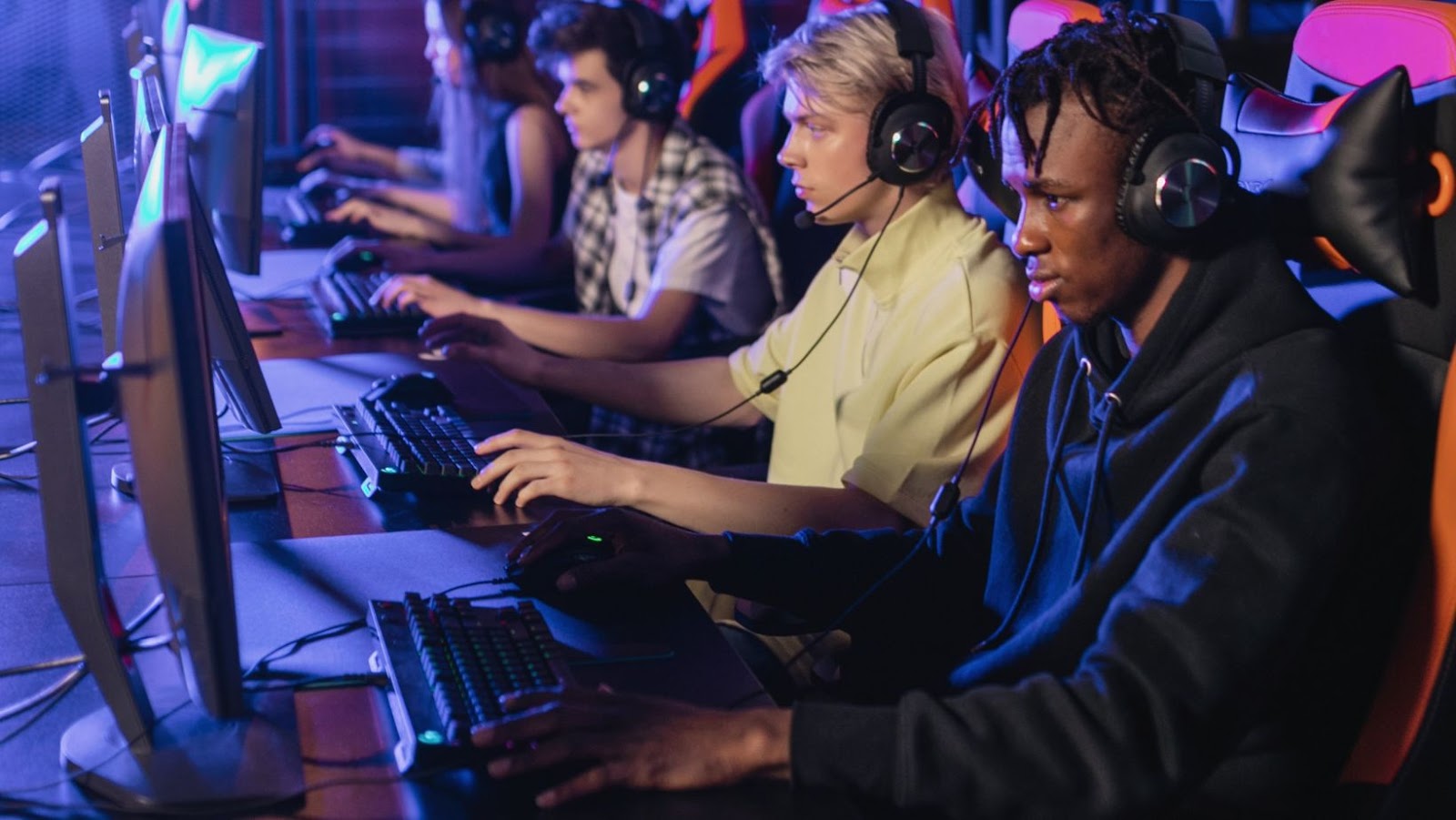
Esports have been steadily gaining traction around the world, with the industry already being worth billions of dollars and boasting millions of fans.
The growth of esports has raised the question of whether they should be included in the Olympics. In this article, we will discuss the prospects of esports being included in the Olympics, looking at both the pros and cons.
Are There Esports in The Olympics
Esports, short for Electronic Sports or E-Sports, is a catch-all term used to describe professional competitive gaming. Competitive esports games are governed by additional rules and regulations and require unique coaching methods, just like other traditional sports. It is estimated that nearly 500 million people worldwide actively participate in esports. At its core, esports is a video game competition between two players or teams of players playing either against each other or against an artificial intelligence (AI) opponent. Players in an esports tournament may compete across multiple genres of video games such as first-person shooters (FPS), real-time strategy (RTS), fighting games, sports simulations, and more. While mainly played online via the internet today, some tournaments are still held as offline events at dedicated esports arenas and stadiums around the world. Esports competitions have seen significant growth in recent years with prize pools regularly reaching into the millions of dollars. These prize pools are sometimes generated from microtransactions made by fans such as cosmetic clothing or weapon skins available only within the game’s own economy. This makes esports attractive to brand sponsors who want to capture the loyalty and enthusiasm of this constantly growing fanbase with immersive marketing strategies tailored specifically to target young people passionate about competitive gaming.
History of Esports in The Olympics
Esports has seen a rise in popularity since the early 2000s, with more than 450 million people tuning into competitive gaming events in 2019. Esports interest and viewership continues to grow, with many established and aspiring professional players competing for millions of dollars in prize money. There has been an increasing push from gamers and fans alike to have esports recognized as an official sport at the Olympics. Although esports have yet to be recognized as a sport at the Olympic Games, its history stretches back further than you may expect. The inaugural International Electronic Sports Federation (IeSF) World Championship was held in 2008, shortly followed by the first IeSF Asian Championship in 2009. In 2010, competitive gaming made its debut at the Asian Games, appearing as a demonstration sport with five titles — Starcraft II: Wings Of Liberty; Counter Strike Online; Legendary Heroes; FIFA Online 2; and Tekken 6 — being contested by seven different countries across nine nations. The event marked the first time that competitive gaming had ever been held alongside traditional sports competitions on such a scale. The Olympic Council of Asia later announced that it would include two more titles — Dota 2 and Hearthstone — for 2018’s iteration of the event and will potentially increase esports participation even further for 2022’s Asian Games. In 2017, Intel also launched its own annual Intel Extreme Masters world championship series which featured high-profile events such as DreamHack Atlanta and DreamHack Summer 2019 aiming to promote global awareness of esports in the hopes that one day they will become part of the official Olympic program.
The Current Status of Esports
Esports have seen a huge surge in popularity in recent years as more and more people have taken to playing games on the internet. This has prompted questions of whether or not esports could ever become part of the Olympic Games. In this article, we will look at the current status of esports in the Olympics. We will examine the issues that need to be addressed before the International Olympic Committee (IOC) can consider esports a legitimate Olympic sport.
Esports in The Olympics
Since the emergence of esports, they have experienced an increased level of acceptance on the international level. With many governing organizations investing in, or recognizing esports as a legitimate sport, it is only natural to ask whether esports could one day be featured in the Olympics. The International Olympic Committee (IOC) has taken a positive stance on esports and has moved to collaborate with various companies and organizations involved in professional competitive gaming. In 2017, during its 127th Session of IOC held in Peru, it was proposed that competitive gaming could appear at the 2022 or 2026 Asian Games being held by Olympic Council of Asia (OCA). During this session the IOC recognized competitive video-gaming as an official sports activity and had indicated there is “recognition that eSport could be considered as a sporting activity” with potential for Olympic recognition.
In December 2018, Intel revealed plans for their Extreme Masters events to be held in partnership with IEM Beijing followed by an Intel Grand Slam competition series of showdowns ending at Intel Grand Slam Counter-Strike World Championships planned for 2020 Tokyo Summer Olympics. Contrary to initial speculation that this was an indication towards potential inclusion of CS: GO at 2024/2028 Paris Olympics, later it was clarified that Intel’s plans are limited to hosting IEM tournaments independent of Olympic context or support framing it merely as advertisement move leading up to Tokyo 2020 Olympics. Ultimately though, while there will likely always be talk surrounding esports inclusion in the Olympics, things are still far from becoming a reality due to various issues such as censorship legislations worldwide or sanctions stopping major players from participating etc., which has caused discussion to lose momentum over time making esport’s appearance at prestigious multi-sport events like summer olympics appear increasingly unlikely any time soon.
Esports in The Paralympic Games
The Paralympic Games is an elite sporting event for athletes with physical disabilities, and esports has proven to be an especially relevant means of inclusion for gamers with physical impairments. The International Paralympic Committee (IPC) has already organized esports tournaments at the 2018 Asian Para Games and 2020 World Para Games, and discussions are underway to include Gaming as a medal sport in the 2024 Paralympic Games in Paris. In 2021, the IPC announced that gaming would be included as an official Paralympic sport – with its own medals – in the Paris 2024 Paralympics. This has been met with immense excitement by fellow gamers across all disability categories, giving many of them a platform to show off their skills while championing representation within the esports space. Leading up to this decision, several organizations have refocused efforts on making gaming more accessible to those with disabilities through initiatives such as game controllers tailored specifically for gamers with disabilities and events, such as Dreamhack’s “Accessibility Community Corner” which focuses on broadcasting disabled content creators at DreamHack events. These developments signal that there is still room for growth in esports integration into mainstream society via international level platforms like the Olympics or Paralympics; it is clear that Esports at the highest level believes in diversity and is committed to providing equal opportunity for all participants regardless of disability – both in competition, but also within industry roles such as commentators or casters. For those passionate about gaming who may not have felt welcome before, it’s truly a sign that change is beckoning for better inclusion!

Challenges Facing Esports in The Olympics
While esports is gaining traction as a legitimate sport, there are still a few challenges that have yet to be overcome before it can become part of the Olympic Games. Issues like the lack of uniform rules, the esports industry’s reputation, and the availability of quality players could all hinder the progress of esports within the Olympic Games. In this heading, we’ll take a look at some of the challenges that esports is facing in entering the Olympic Games.
Lack of Recognition
One of the biggest challenges facing esports in its quest for Olympic recognition is a lack of international acknowledgment. The International Olympic Committee (IOC) has recognized that esports combines both sporting and gaming elements, however, it has yet to acknowledge esports as a legitimate sport. The IOC’s inclusion policy states that any activity included as an official sport must be “widely practiced by men in at least 75 countries and on four continents, while women must practice the activity in no fewer than 40 countries on three continents”. Traditional sports like soccer, athletics and basketball easily fulfill this criteria but it is much more difficult for esports to reach enough countries to be recognized. Additionally, the IOC has voiced concerns over industry regulation when it comes to issues such as gambling, match-fixing and doping which are often associated with esports. Without regulation from global governing bodies or assurance from key countries such as Japan or China who do not want violent games featured at their events, recognition by the IOC may be a long way off. However, there are ongoing dialogues between the industry leaders and governments that may lead to a new era wherein esports holds a legitimate place among traditional sports within the Olympics framework.
Lack of Regulation
The growing phenomenon of esports is still regarded by many to be secondary to traditional sports. This is partly due to the lack of a universal regulating body for esports, unlike the International Olympic Committee (IOC) for traditional sports. This has created an environment where anyone or any organization can create and implement their own rules, making it difficult for potential Olympic nations to regulate esports tournaments. The lack of an established regulatory framework is also a major barrier in terms of sponsorship opportunities. The current system in place relies heavily on crowdfunding from fans of the game and partnership with other companies, limiting potential investments from bigger sponsors such as actual Olympic sponsors. Another challenge faced by esports in regards to gaining official status in the Olympics are issues involving its collegiate scene. With some collegiate teams promising large amounts of money or even scholarships as inducements, questions have been raised concerning the fairness of such practices, which could potentially be seen as bribery if not regulated properly. It also puts institutes at risk since they could face sanctions if they are found guilty of having encouraged unfair practices among their student athletes.
Lack of Professionalism
One major challenge that esports face when it comes to being accepted into the Olympics is the lack of professionalism within the sport. Professional sporting leagues such as the National Basketball Association (NBA), National Football League (NFL), and Major League Baseball (MLB) are all members of national sports governing bodies in the United States. These governing bodies have strict rules and regulations for players, teams, and organizations that all have to adhere to. This gives these leagues a more legitimate competitive structure which makes them attractive to Olympic committees. On the other hand, esports currently lacks any kind of consistent professional structure that would be accepted by Olympics organizers as legitimate representation of the sport. As esports continues to grow in popularity, many third party organizations have sprung up in an attempt to create various regional and global competitive structures for different video game titles. As this is occurring on such a wide scale with no unified rules or regulations, it has caused issues ranging from cheating controversies to player welfare concerns. Additionally, it has cast uncertainty on record keeping leading companies like Guinness World Records having difficulty acknowledging some gamers and their accomplishments within games that do not currently have accredited tournaments or standings backed by big companies or government institutions.
Due to this lack of professionalism across many aspects of the industry, there is still some hesitancy from Olympic committees regarding whether esports can truly be considered a legitimate Olympic sport despite its immense popularity among younger generations around the world.
Benefits of Esports in The Olympics
As esports continues to become a bigger and more popular industry, the question of whether it will be included in the Olympics has been raised. While the official decision is yet to be made, the potential for esports to become part of the Olympic Games is growing. This section will explore the potential benefits of esports in the Olympics and what it could mean for the future of the industry.
Increased Participation
The inclusion of esports in the Olympics can lead to increased participation, both among players and viewers alike. According to a study conducted by Nielsen in 2020, 28% of Americans said they’d be willing to watch Olympic esports content if it was offered. This study also showed that young adults between 18 and 34 are the most enthusiastic about making esports a part of the Olympics, with 41% saying they would want to watch it. Esports presents an opportunity for individuals from all backgrounds and all ages to engage in physical activity—but in a much more accessible way. The same Nielsen survey revealed that 57% of Americans felt that including esports in the Olympics would inspire more young people to pursue an active lifestyle. For those who have limited access or experience with traditional sports or exercise, esports is an attractive option as it requires a different set of skills while still offering competition and social interaction opportunities. The inclusion of esports at the Olympic level will promote diversity and making physical activity both accessible and enjoyable—as well as providing positive role models for aspiring players from all walks of life.

Increased Exposure
The introduction of esports into the Olympics would undoubtedly create an unprecedented amount of exposure for the global gaming community. Esports leagues and tournaments sponsored by non-Olympic entities attract some measure of mainstream attention, however becoming an official Olympic sport would thrust esports into the international spotlight. Additionally, Olympic inclusion brings a whole new set of sponsorships and opportunities to increase viewership via mainstream media outlets. The recognition and publicity accompanying Olympic status could also lead to better compensation packages for professional gamers. Mediation and significant rule changes that guarantee fair play become possible with a seat at the Olympic table, providing a tangible benefit to players who have traditionally functioned without a centralized governing body or any sort of unionization. Governments might also choose to redirect funding towards local gaming communities, incentivizing developers and encouraging more people to participate in competitive gaming events. Ultimately, gaining admission into the Olympics is about much more than recognition — it’s about building something self-sustaining and cementing esports’ place at the forefront of competitive entertainment for generations to come. The additional sponsorship funds associated with this event could lead to better prize money across all sanctioned tournaments, giving gamers greater incentive to go professional or simply pursue their passion at whatever level they can attain — amateur or semi-professional — without sacrificing financial stability. Gaining acceptance in the Olympics could truly revolutionize the world of competitive gaming, creating newfound success stories often overshadowed by more traditional sports entertainment spectacles already occupying major leagues worldwide.
Increased Investment
The addition of esports to the Olympic roster could bring increased investment from both corporate and individual stakeholders. As the international competitive gaming industry continues to grow and expand, events such as the Olympics offer an excellent opportunity for investors to nominate teams that can showcase their games around the world. Furthermore, this allows for competitive gaming fans from across the globe to engage with each other and share in the excitement of professional gaming. In addition, new investors may be encouraged to enter the esports market in order to capitalize on its potential growth; should more resources become available, this will enable established organizations and players to invest in training camps, proper gear and improved sponsorship deals. This would also permit smaller teams that receive less investment or attention at present, a chance to break into the competitive scene. Overall, it is clear that increased investment opportunities following Olympic recognition will bring about a plethora of opportunities for those involved in competitive gaming ranging from better team management structures through sponsorships reducing player’s financial burden of training expenses; allowing players greater freedom in following their chosen path whilst gaining priceless experience alongside some of their idols – paving a way for further strong contingents representing their countries at future international events like The Olympics.
Conclusion
Esports has seen a massive surge in popularity over recent years, with the industry growing exponentially. This has created an increased interest in whether esports will be featured in future Olympic games, and the potential associated benefits. In this article, we will explore the feasibility of esports being featured in the Olympics, the potential benefits and risks involved, and the likeliness of them being included in future Olympics games.




